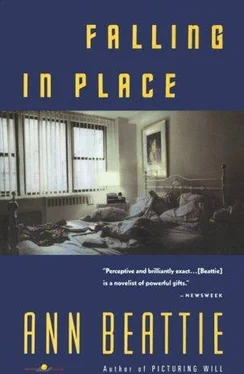Ann Beattie - Falling in Place
Здесь есть возможность читать онлайн «Ann Beattie - Falling in Place» весь текст электронной книги совершенно бесплатно (целиком полную версию без сокращений). В некоторых случаях можно слушать аудио, скачать через торрент в формате fb2 и присутствует краткое содержание. Год выпуска: 1991, Издательство: Vintage, Жанр: Современная проза, на английском языке. Описание произведения, (предисловие) а так же отзывы посетителей доступны на портале библиотеки ЛибКат.
- Название:Falling in Place
- Автор:
- Издательство:Vintage
- Жанр:
- Год:1991
- ISBN:нет данных
- Рейтинг книги:4 / 5. Голосов: 1
-
Избранное:Добавить в избранное
- Отзывы:
-
Ваша оценка:
- 80
- 1
- 2
- 3
- 4
- 5
Falling in Place: краткое содержание, описание и аннотация
Предлагаем к чтению аннотацию, описание, краткое содержание или предисловие (зависит от того, что написал сам автор книги «Falling in Place»). Если вы не нашли необходимую информацию о книге — напишите в комментариях, мы постараемся отыскать её.
Falling in Place — читать онлайн бесплатно полную книгу (весь текст) целиком
Ниже представлен текст книги, разбитый по страницам. Система сохранения места последней прочитанной страницы, позволяет с удобством читать онлайн бесплатно книгу «Falling in Place», без необходимости каждый раз заново искать на чём Вы остановились. Поставьте закладку, и сможете в любой момент перейти на страницу, на которой закончили чтение.
Интервал:
Закладка:
“You know what she probably wants,” Mary said. “You could get her another German shepherd.”
“Your mother?”
“Yeah. That’s what she’d like. Another dog. I’ll bet you.”
“I think she just liked that particular dog. If she wanted another one, I think she would have gotten it.”
“Maybe not,” Mary said. “Maybe she just never got around to it.”
“Would you like to have a dog around the house?”
“She would. She talks to Tiffy all the time about the dog.”
“She talks to Tiffy all the time about you, too, you know.”
“She liked the dog better. You know she did. Face it.”
“Of course she didn’t like the dog better than she likes you.”
Mrs. Patterson looked up from the magazine, pretending to be shaking a curl that had fallen on her forehead out of the way. She pushed the curl back in place and bent over the magazine again.
“Mary,” he said, “I don’t want to upset you, but I can’t let you say something like that. You don’t believe that.”
“I was just kidding.”
“No you weren’t. Do you believe that?”
“No,” she said.
“Good,” he said. He thought that she was lying to him and that she had meant it. He was trying to think of what to say next, when a man carrying a lunch tray came in. He took the top off the tray, clattered it onto the shelf underneath his pushcart and said, “There you go,” setting the tray on the tray table. Mrs. Patterson jumped up. There were carrots on the plate. Mashed potatoes. Gray meat.
“Doesn’t this look delicious,” Mrs. Patterson said.
He went to the waiting room while she ate. He said that he had to make a phone call and would be right back, but it was a lie. He couldn’t stand to see her eat that food. He couldn’t stand to think that his daughter thought Louise had liked her German shepherd more than she liked her. There was some truth in it, of course. The dog wasn’t distant. It wasn’t self-absorbed. But didn’t adolescents always draw away from their parents? Didn’t they all have a period when they felt superior, when they were critical or distant, just wanting to block their parents out? Mary had blocked them out. They had also blocked her out. His son had shot his daughter. He was not entirely sure who his daughter was. John Joel was much more understandable, even though he still couldn’t believe that he had fired a gun, that he had shot not caring if he killed Mary. He was understandable because … He got up and went into the phone booth. His son wasn’t understandable, and his daughter wasn’t understandable, except now, when she was hurting and punishing her parents for what had happened. Louise was understandable, up to a point. He had thought that he had understood her a while back, when he had been standing at the bedroom window watching shooting stars dart and fade in the sky, and something they had been talking about, whatever it was — somehow she had told him, point-blank, that she didn’t want to know everything. That meant that she knew, and didn’t want confirmation. Didn’t want details. Yet if she knew, and if she didn’t have much feeling for him or even care if he was there, why would she plan a vacation to Nantucket? And if she did, why wouldn’t Tiffy have talked her out of it? Louise had told him that Tiffy said her greatest problem was that she had to develop a sense of pride. He could tell by the way Tiffy looked at him that she hated him.
He called Nick. It was Saturday, and Nick would be home. He dialed his apartment, and a woman answered.
“He went out for groceries,” the woman said. “Who’s this?”
“It’s John. It’s not important. Tell him I’ll call back.”
“Want me to have him call you?”
“I’m not home. I’m at a phone booth. I’ll call him tonight.”
“You don’t sound good,” the woman said.
“What?” he said. “Who’s this?”
“Carolyn Ross,” she said.
He had never heard of Carolyn Ross.
“I’m okay,” he said. “Fine. I’ll call back later.”
“Sure,” she said. “He should be back in an hour.”
It wasn’t until he put the phone back that he realized that he was seeing yellow shimmering around the edges of things. But he never fainted. He couldn’t be about to faint after doing nothing but standing in his daughter’s room and going out into the corridor to make a phone call. He looked at his hands, and they looked as though small yellow sparks were coming off them. He got out of the phone booth and went to a sofa and sat down. The yellow paled, shimmered, gradually disappeared. He sat there, trying to breathe normally. What would he do with them in Nantucket? Go to the beach. Sail. Watch clouds change shape. Buy fudge. Post cards.
He couldn’t. He could do it for a week, two weeks, but he couldn’t do it for the rest of his life. He thought of Metcalf, and how he took his lover with him for the family’s annual East Hampton vacation. He told his wife she was there to help with the children, and the woman came along. Year after year she came along. He paid her on Fridays, and she took the checks. She lived on Park Avenue, in an apartment Metcalf rented for her. It galled Metcalf that she actually cashed the checks, when he gave her almost twenty thousand dollars a year, plus an apartment on Park Avenue. They did it for five summers, and then Metcalf’s wife informed him at the last minute that her sister was taking the children for July, and that the vacation could be for just the two of them. Proud of thinking quickly, Metcalf had said that he felt duty-bound to have the au pair anyway, because she had been counting on the money, and that she could come and take care of the house. When he told Jenny, his mistress, what he had worked out, she just stared at him silently. He had no idea, Metcalf said, that asking her to clean house had been the straw that broke the camel’s back. When he left, Jenny called his wife and told her what was going on. Bad enough that she had to put up with two bratty kids every summer — she was not going to clean somebody’s house, she told Metcalf’s wife. Metcalf showed up in the office the first of August, when everybody thought he would be gone, because his wife and Jenny were in the East Hampton house, and they wanted two weeks to work it out and become pals before he went there. Metcalf kept threatening to get in his car and put a stop to it, but he never did. He spent the last two weeks of August there and said that although he’d lost respect for Jenny, he had still never been kissed the way she kissed him, and he was going to go on supporting her. “For a kiss,” Metcalf said. “Not a lay, a kiss. The way she kisses.” Metcalf had come back and slammed tennis balls against the wall in the corridor outside his office, letting his phone ring, getting violently angry if anyone objected to the noise or asked him a question. “A kiss,” Metcalf kept saying over and over. “A good kiss should be everybody’s birthright.”
A young man in his early twenties, at the other end of the sofa, was watching John out of the corner of his eye. John was trying to look normal, to convince his body that it could function normally. It would be humiliating to fall over in the waiting room. He tried to breathe normally. To blink. It was difficult not to blink hard and often when you thought about blinking. It was hopeless the way it was hopeless to be aware of your tongue and not have it feel too big for your mouth. The man was holding something out to him, with a little corona of light around it. The light faded as John stared at the pack of gum with one piece slid out, finally realizing what it was. “No thanks,” he said. He tried to remember the last time he had chewed gum. With Brandt, about a year ago, to show him how to chew without making faces. Pilar, his mother’s cook, had introduced him to chewing gum. She also let him eat raw cookie dough, which was bad for him. However, as his mother always said when she finished a list of grievances against Pilar, she never skimped on lime in the gin and tonics, and never once had they run out of ice. Her stews were very good, although she would make them all summer long unless she was stopped. His mother had recently given Pilar some cookbooks with recipes for cold summer meals. Diced cucumber and cold salmon loaf. Argentine eggs with pasta. He had just been offered a stick of Juicy Fruit chewing gum, and his mouth was watering as much as it would if he had taken the stick and chewed it. He could smell the gum. He looked at the young man. The man was looking at him.
Читать дальшеИнтервал:
Закладка:
Похожие книги на «Falling in Place»
Представляем Вашему вниманию похожие книги на «Falling in Place» списком для выбора. Мы отобрали схожую по названию и смыслу литературу в надежде предоставить читателям больше вариантов отыскать новые, интересные, ещё непрочитанные произведения.
Обсуждение, отзывы о книге «Falling in Place» и просто собственные мнения читателей. Оставьте ваши комментарии, напишите, что Вы думаете о произведении, его смысле или главных героях. Укажите что конкретно понравилось, а что нет, и почему Вы так считаете.












